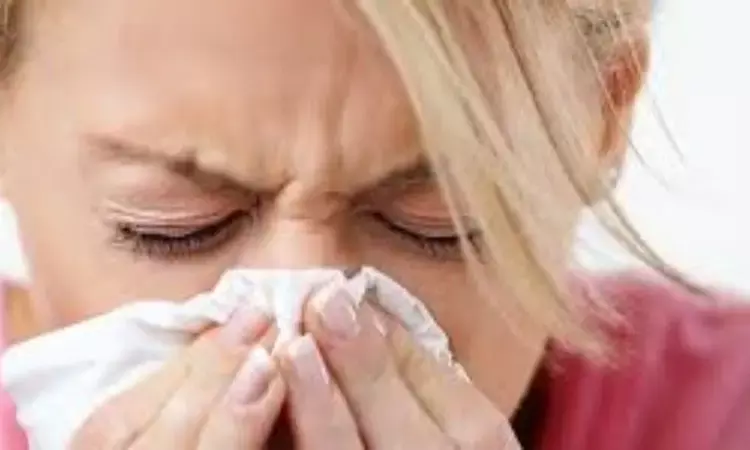- Home
- Medical news & Guidelines
- Anesthesiology
- Cardiology and CTVS
- Critical Care
- Dentistry
- Dermatology
- Diabetes and Endocrinology
- ENT
- Gastroenterology
- Medicine
- Nephrology
- Neurology
- Obstretics-Gynaecology
- Oncology
- Ophthalmology
- Orthopaedics
- Pediatrics-Neonatology
- Psychiatry
- Pulmonology
- Radiology
- Surgery
- Urology
- Laboratory Medicine
- Diet
- Nursing
- Paramedical
- Physiotherapy
- Health news
- Fact Check
- Bone Health Fact Check
- Brain Health Fact Check
- Cancer Related Fact Check
- Child Care Fact Check
- Dental and oral health fact check
- Diabetes and metabolic health fact check
- Diet and Nutrition Fact Check
- Eye and ENT Care Fact Check
- Fitness fact check
- Gut health fact check
- Heart health fact check
- Kidney health fact check
- Medical education fact check
- Men's health fact check
- Respiratory fact check
- Skin and hair care fact check
- Vaccine and Immunization fact check
- Women's health fact check
- AYUSH
- State News
- Andaman and Nicobar Islands
- Andhra Pradesh
- Arunachal Pradesh
- Assam
- Bihar
- Chandigarh
- Chattisgarh
- Dadra and Nagar Haveli
- Daman and Diu
- Delhi
- Goa
- Gujarat
- Haryana
- Himachal Pradesh
- Jammu & Kashmir
- Jharkhand
- Karnataka
- Kerala
- Ladakh
- Lakshadweep
- Madhya Pradesh
- Maharashtra
- Manipur
- Meghalaya
- Mizoram
- Nagaland
- Odisha
- Puducherry
- Punjab
- Rajasthan
- Sikkim
- Tamil Nadu
- Telangana
- Tripura
- Uttar Pradesh
- Uttrakhand
- West Bengal
- Medical Education
- Industry
Intratonsillar Immunotherapy Safe and Effective for Allergic Rhinitis, suggests research

Allergic rhinitis (AR) is a common condition affecting millions globally, often triggered by allergens such as house dust mites (HDM). Allergen-specific immunotherapy (AIT) is the only curative treatment for IgE-mediated allergies like AR; however, its lengthy duration and adverse effects hinder patient adherence. Thus, investigating alternative AIT routes is crucial to improving treatment outcomes.
Traditional AIT involves subcutaneous or sublingual administration, necessitating frequent visits and increasing the risk of systemic adverse reactions. Intratonsillar injection, a novel approach, targets the tonsils, which play a crucial role in immune responses, potentially enhancing treatment efficacy and safety.
A recent randomized, double-blind, placebo-controlled clinical trial aimed to evaluate the efficacy and safety of intratonsillar injection with HDM extract in patients with HDM-induced AR. This study was published in the Annals of Allergy Asthma & Immunology: Official Publication of the American College of Allergy, Asthma, & Immunology. The study was conducted by Junyan Z. and colleagues.
Eighty patients with HDM-induced AR were randomly assigned to receive either intratonsillar injections of HDM extract or placebo over three months. Various outcome measures, including total nasal symptom score (TNSS), visual analogue scale, symptom and medication score, quality of life questionnaire, and serum allergen-specific IgG4 levels, were assessed at baseline and up to 12 months post-treatment.
The key findings of the study were:
• At 3 months post-treatment, TNSS and ΔTNSS significantly improved in the active group compared to placebo.
• Sustained improvements in visual analogue scale, combined symptom and medication score, and quality of life questionnaire in the per-protocol set.
• Patients receiving intratonsillar immunotherapy exhibited a significant increase in serum Der p IgG4 levels at 3, 6, and 12 months post-treatment.
• No systemic adverse reactions were observed, indicating the safety of intratonsillar injection with HDM extract.
The study demonstrates the potential of intratonsillar immunotherapy as a safe and effective treatment for HDM-induced AR. The observed improvements in symptoms and serum IgG4 levels highlight the promising role of this innovative approach in AIT.
Intratonsillar injection offers a convenient and well-tolerated alternative to traditional AIT methods, potentially enhancing patient adherence and treatment outcomes. Further optimization of protocols and allergen formulations may enhance the efficacy and durability of this novel approach.
Intratonsillar immunotherapy with HDM extract emerges as a promising therapeutic option for patients with AR, offering both efficacy and safety benefits. Continued research and refinement of this approach hold potential for significant advancements in AIT for allergic diseases.
Reference:
Zhang, J., Yang, X., Chen, G., Hu, J., He, Y., Ma, J., Ma, Z., Chen, H., Huang, Y., Wu, Q., Liu, Y., Yu, L., Zhang, H., Lai, H., Zhang, J., Zhai, J., Huang, M., Zou, Z., & Tao, A. (2024). Efficacy and safety of intratonsillar immunotherapy for allergic rhinitis: A randomized, double-blind, placebo-controlled clinical trial. Annals of Allergy, Asthma & Immunology: Official Publication of the American College of Allergy, Asthma, & Immunology, 132(3), 346-354.e1. https://doi.org/10.1016/j.anai.2023.10.029
Dr Riya Dave has completed dentistry from Gujarat University in 2022. She is a dentist and accomplished medical and scientific writer known for her commitment to bridging the gap between clinical expertise and accessible healthcare information. She has been actively involved in writing blogs related to health and wellness.
Dr Kamal Kant Kohli-MBBS, DTCD- a chest specialist with more than 30 years of practice and a flair for writing clinical articles, Dr Kamal Kant Kohli joined Medical Dialogues as a Chief Editor of Medical News. Besides writing articles, as an editor, he proofreads and verifies all the medical content published on Medical Dialogues including those coming from journals, studies,medical conferences,guidelines etc. Email: drkohli@medicaldialogues.in. Contact no. 011-43720751


